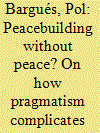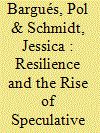| Srl | Item |
| 1 |
ID:
171920


|
|
|
|
|
| Summary/Abstract |
The International Relations (IR) literature has strongly criticised the invasive and top-down nature of liberal peace, facilitating a reinterpretation of the practice of international intervention in conflict-affected societies. Today, sustaining peace policy approaches advance longer-term missions, give a secondary role to external practitioners, and increasingly accept risks and failures. What is striking is that even when these policy discourses hold out the promise of liberating peacebuilding from dominant and top-down models of liberal intervention, the mood in the field is one of despair. By drawing on John Dewey's work on pragmatism and interviewing practitioners in Bosnia and Kosovo, the article reflects on the morass practitioners find themselves, diagnoses the source of the frustrations, and anticipates the direction of sustaining peace. Pragmatism adumbrates the idea of ‘peacebuilding without peace’, encouraging practitioners to experiment, give primacy to their doings and explore this world without hope of success and dreams of otherworldliness.
|
|
|
|
|
|
|
|
|
|
|
|
|
|
|
|
| 2 |
ID:
182438


|
|
|
|
|
| Summary/Abstract |
This article explores the nature of resilience-informed international interventions today by thinking about ‘difference’. Up to the 1990s, international interventions were often characterised by a patronising tone in which backward others needed help to develop. Some 20 years later, key lessons learned were that others were so fundamentally different that efforts to assist them invariably failed. This article argues that contemporary approaches seeking to foster resilience are simultaneously propelled by both approaches. They are thus underpinned by two conflicting understandings of difference: the other that is in need and the other that cannot be attended. Even more, we contend that this contradiction is put to productive use in resilience-building: protracted crises today demand practitioners to ‘be there’, engaged permanently, to speculate, experiment, and affirm radical uncertainty. In order to analyse the novel features of resilience, we draw on Graham Harman’s speculative realism and look at policy programming of the Syrian refugee crisis.
|
|
|
|
|
|
|
|
|
|
|
|
|
|
|
|